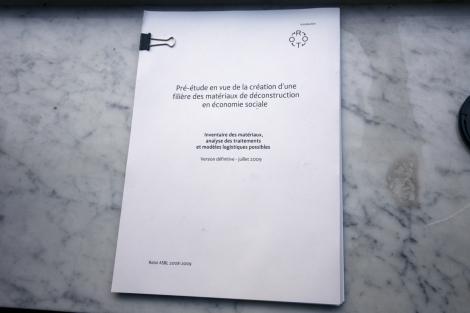A prestudy for the development of a reuse center in social economy in Brussels
This report analyses a series of possibilities to set up a social company for the salvaging and reclamation of construction materials. The report is based on an in-depth analysis of examples carried out in different regions. It shows that if many scenarios are possible, there are also dead-ends - appealing at first sight but economically or practically unviable. Common sense and ecological drivers are not the only components of a viable social economy project.
The report is divided in three main sections:
- The first one analyses the "reusability" (the potential to be reused) of the common construction products. This analyses is based on a series of criteria: (conservation of mechanical properties, conservation of aesthetic properties, facility to be dismantled, transported, stored and reinstalled, toxicity, and comparison with the value of a new equivalent. Each element is assessed in regard to these factors, allowing to present a list of good candidates.
- The second part concerns the effective circulation of the materials: how to organize their acquisition (deconstruction, collect, etc.), their storage (indoor, outdoor, etc.), their conditioning (sorting, cleaning, cutting, verification, etc.) and ultimately their sales (to private or professional clients).
- The last part develops different business models that could be set up for creating a reuse centre in social economy.
On top of that, the study was accompanied by a first directory of 48 reuse dealers active in Belgium. This sheet is the ancestor of Opalis!
Authors:
Maarten Gielen, Michael Ghyoot, and Lionel Devlieger.
Original title:
Pré-étude en vue de la création d'une filière des matériaux de déconstruction en économie sociale. Inventaire des matériaux, analyse des traitements et modèles logistiques possibles (FR)
With the help of:
Alice Versieux, Shelbatra Jashari, Tristan Boniver and Bernadette Denuit.
With the support of:
The federal cabinet of Minister Arena and IBGE.


